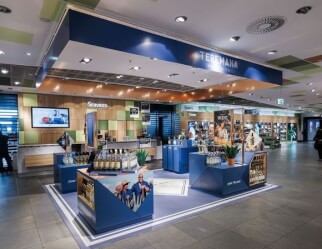m1nd-set research shows COVID-19 shift to responsible consumption
According to the latest research from m1nd-set, consumers are increasingly discerning about social and environmental concerns when shopping for goods and services. The shift to more conscientious consumption is also evident among shoppers in travel retail.
Conducted in Q1 2021, the research assesses the importance of sustainability when shopping, the impact of sustainable attributes on the likelihood to purchase, consumers’ propensity to spend more for sustainable purchases and consumers’ understanding of the circular economy.
Among the key findings from the research, m1nd-set reports that 35% of international travelers purchase more sustainable or environmentally friendly products compared to pre-COVID-19. This tendency is higher among travelers who are willing to fly again immediately after bans and quarantines are lifted (45%), as well as among Chinese travelers (41%), business travelers (40%) and older Millennials (39%). Additionally, 55% of travelers say they are giving more consideration to naturally-sourced and health-conscious products than before the pandemic. The shopper segments for which this perception is higher than the global average include travelers from Latin America (59%), older Millennials, frequent travelers and business travelers (all 58%).
49% of international travelers also say that sustainable packaging is more important to them now than pre-COVID-19. m1nd-set’s customer segmentation analysis shows that frequent travelers, Latin Americans, business travelers and high-income earners, all have above average scores with regards to sustainable packaging. Sustainability of the products themselves is also more important than pre-pandemic for 46% of international travelers, according to the research.
Sustainability boosts brand perception
Sustainable attributes clearly have a strong impact on brand perception and serve as an important purchase driver. 86% of travel retail and duty free shoppers share that a greater focus on sustainability by manufacturers has a positive impact on their perception of the brand. There is also a strong willingness among international travelers to pay more for environmentally-friendly products. 66% of shoppers say that they would be prepared to pay more, particularly female shoppers (70%).
“Socially and environmentally responsible consumption has been a consistently growing trend for some time already; our research demonstrates that this has accelerated not only since COVID-19, but probably because of the global pandemic. We reported the increasing focus on sustainable consumption among travelers early in 2020 and we are encouraged to see this sustainable shopping trend has continued and intensified in the past twelve months.
Around two-thirds of shoppers claimed they make more environmentally-friendly or ethical purchases since the start of the pandemic. Around 90% of these consumers also claimed they will continue to place greater importance on sustainability in the future. This does not only apply to what consumers shop for, but also how they shop. In many markets there has been a shift toward shopping more at smaller local businesses where products are sourced locally, reducing the environmental impact on transport. Smaller local businesses have benefitted as a result.
The tendency among consumers is progressively leaning toward responsible consumption. Consequently, consumers will be increasingly expectant that brands and service providers not only invest more in sustainability, but also communicate about these investments to ensure consumers make informed choices,” comments Peter Mohn, Owner & CEO, m1nd-set.









.jpg?&resize.width=322&resize.height=483)
